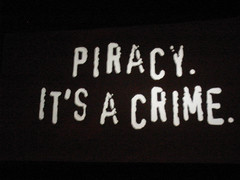Across the entire developed world, you will see piracy warnings from the entertainment industry. They usually make some emotive video about piracy costing jobs (because of six billion dollars in lost revenue) and that you as a consumer should join the fight. But is this really the case? I think laziness is what is costing jobs. Executives are clinging onto an old way of doing things in a new world, and instead of exploring alternative mechanisms, they fight for the past. I think if the industry lets go a bit, they might actually improve the status quo.
Let’s have a look at the movie industry and see the difference.

Currently
Hollywood studio invests in the production of “The man with a Blog”. They have an all star cast, filled with James Bond action scenes and circus freaks.
Movie theatres around the world premier the movie, after months of publicity. Box office sales smash the predictions in that weekend – millions of dollars are spent by people buying movie tickets. Several months later, a DVD version is distributed, giving a second hit at having consumers spend their cash on experiencing this masterpiece. Television networks several years after that will license the movie and play it on TV.
Money continues to stream in – it’s a model that’s worked for decades.
Pause: two important things to note
Unlike reading a blog, for example – where your attention can wander and not be fully engaged – a movie has the full engagement of the consumer. They’re absorbing every sound and image being presented to them. So engaged are the consumers that people will rewind the movie to rehear a line they missed. They will pause the movie if they need to go to the bathroom, for fear of missing out on a scene.
Another thing to note is that the consumer is having an experience. Even if they “own” a copy of the movie, all they are truly buying is a license to replay the movie in the convenience of their homes. When a consumer buys tickets or a DVD to a movie, what they are really buying is access to an experience that can provoke them intellectually and stimulate them emotionally. Beyond stimulating an individual, it also serves as a cultural tool in our society, allowing people to have shared experiences that can then allow them to relate to each other – like how two strangers laughing over a movie will create a bond.
Replay
So why can’t movies be free? And if they were, who are they hurting? Let’s now replay the blockbuster described above and see the difference.
Hollywood studio invests in the production of “The man with a Blog”. They have an all star cast, filled with James Bond action scenes and circus freaks.
Movie theatres around the world premier the movie, after months of publicity. Box office sales smash the predictions in that weekend – millions of dollars are spent by people buying movie tickets who are paying for the experience of being in a room of people laughing with premium surround sound, a premium screen, and an excuse to snuggle up with their first date. Several months later, a DVD version is distributed, giving a second hit at having consumers spend their cash on experiencing this masterpiece – consumers will pay for the DVD because they like to store their movies on a shelf for reuse. Downloading the movie over the computer eats their bandwidth and storage space, and while some will do it, the value proposition of a physical storage item still exists. Because although they can download a medium-quality movie over their connection – they might want to one night experience a high quality version on their big plasma TV. So they will willingly pay for that DVD, which in bandwidth terms, is a hell of a lot cheaper.
Television networks several years after that will license the movie and play it on TV. Because at the end of the day, if other people are going to generate revenue on your assets, they should continue to seek licenses to do so. Sharing a movie to other consumers should not be a crime, but showing it to mass audiences where you take the full sales, is.
Money continues to stream in – it’s a tweaked model that honestly don’t affect the world that much. Or jobs in the industry, other than the lawyers.
Fast forward
The movie industry is under-exploiting two essential characteristics I mentioned above: the undivided attention of the consumer and the fact they generate an experience for consumers. In the old world, that’s what advertising agencies were paid for to achieve!
I’ve previously argued that online advertising is a bubble economy, but that’s not to say advertising is dead. If fact, brand advertising is something I expect to thrive, and something like a movie is the best opportunity to take advantage of it.
Movies are replaying our lives, in a real or fantasy way. They are a replication of life, with consumer products filling the screen just like they do in our lives. When I watch my favourite actor talking in a scene, I am taking in the visual experience – and allowing product exposure to my attention. If I see a funky piece of furniture in that room, I should be able to interact with that – like clicking on it for more information and perhaps even create a direct order to buy. Television networks have spent decades monetising movies by showing advertisements in between regularly scheduled breaks (which disrupt the experience). Why not make advertising an embedded experience during the movie? It’s non intrusive and it’s relevant – a much better way of doing it.
Every time someone clicks on a table in a movie, the movie studio gets a cut out of the sale. Indeed, the supply of the table in the movie could also come as a form of premium sponsorship, as the studio is promising the supplier guaranteed exposure to an audience. The exact reason why people advertise: exposure to an audience.
Taking it a step further, we haven’t even got to explaining brand advertising opportunities. Imagine if your favourite actor is wearing a new style of jeans – isn’t that going to influence your thinking? Even if we consciously don’t think much of the jeans, the experience of being in a happy state watching our favourite actor, generates an emotional bond with that consumer product. It’s doing what advertisers have spent decades trying to master: building an emotional connection and a need with a new product.
The scenes that have been cut out
What I’ve just done here, is made you realise that movies can still be sold despite being free – but people will happily pay for it as they are really buying a unique experience. The actual movie itself should be free for consumers and there is untapped opportunity to innovate in this sphere.
There is an Israeli startup that allows you to embed advertising in a movie. What’s the big deal about that? Well every time someone downloads the movie, they will get an updated ad. So the original publisher can actually control the content for an entire lifetime: once an ad has been inserted, it can simply be replaced with the newest advertiser to sign up.
Imagine if movie studios distributed free versions of their movies, with commercial breaks like TV – and an option to pay to remove those ads for those willing to do so. And imagine, if with a bit more research, technology could be evolved so that scenes within a movie showcasing consumer products, could be updated with a new product. The painting on a wall can now be replaced with another painting. It’s already being done for computer games – why not movies, that themselves now rely on computer generated graphics?
When thinking of the opportunity in that way, restricting access to that movie is no longer in the studio’s incentive. With an audience, you monetise more by having a bigger audience. And so making something free, actually could make more money because demand will not be affected by price elasticity.
La Fine
Once you think about things in this light, you realise the enormous opportunity available. And hopefully, you too also realise that what’s holding us back from this innovative, less-obtrusive, higher-value-generating future – is outdated thinking. Because as long as we cling onto the past, we are preventing bold strides into new models that potentially will make more money, if done right.
It’s a bold statement to say that you should support movie piracy, but it’s actually forcing the industry to adapt to this new world. Piracy has made us reevaluate the value of movies when the distribution line can no longer be fully controlled, and continuing to do it forces our legislators to reconsider public policy on intellectual property that was made for another age.
Using pirated material isn’t costing jobs in the entertainment industry – it’s doing something much better. It’s getting some media company executives in trouble, as they haven’t got the guts to innovate.


